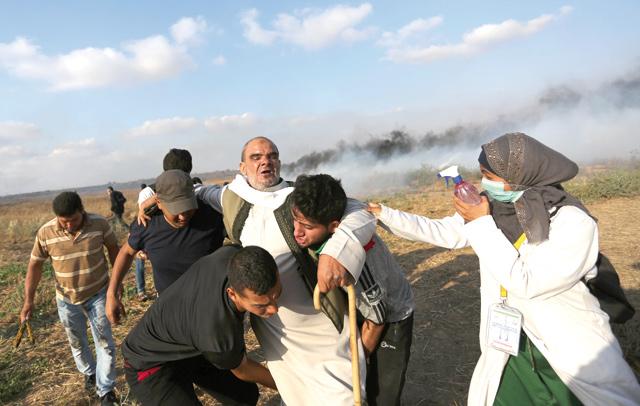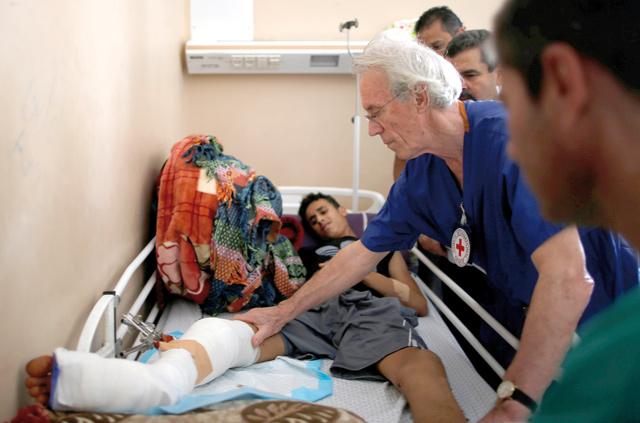You are here
Gaza hospitals strive to cope with numbers of wounded protesters
By Agencies - May 15,2018 - Last updated at May 15,2018

An injured Palestinian lies on a bed in the corridor of a hospital in Gaza City on Tuesday (Reuters photo)
GAZA, Palestinian Territories — Worried families crowded the halls and spilled out of rooms in Gaza's hospitals on Tuesday, as patients wounded by Israeli occupation forces at a border protest awaited treatment for injuries suffered on Monday, the deadliest day for Palestinians in years.
In addition to 60 Palestinians killed by Israeli occupation forces on Monday — when the United States opened its embassy in Jerusalem — more than 2,400 received wounds needing hospital treatment, Gaza medics said, the Reueters News Agency reported.
At Gaza City's Shifa hospital, the largest of the Gaza Strip's 13 medical facilities, officials ordered field tents to be put up in the hospital courtyard last week, fearing a likely surge in casualties from the protests around the time of the embassy opening.
Bassem Ibrahim, who said he was shot in the leg by Israeli occupation forces, said at one stage he had feared losing the limb because of the delays in treatment, as reported by Reueters.
"There are not many doctors. They are unable to see everyone, with all the injuries," said Ibrahim, 23.
"The number was unbelievable and they did not have time. My leg was bleeding a lot."
The director of Shifa's emergency department, which has only 20 beds, said his staff received 500 wounded patients on Monday, nearly 20 per cent of all the injuries that day across Gaza.
"We are talking about 25 times the capacity of the emergency department, with all the big challenges and the shortage of medicine and medical supplies that has reached critical levels," Ayman Al Sahabani told Reuters.
"A lot of these patients are waiting their turn to enter the operating rooms," Sahabani added.
He said Gaza needed more vascular and orthopedic surgeons in particular, because of the nature of the injuries suffered.
Agence France-Presse reported on Tuesday that 115 people had been killed by Israeli occupation forces’ fire since the protests began on March 30.
Power blackouts
Nickolay Mladenov, the UN Special Coordinator for the Middle East Peace Process, briefed the Security Council on Tuesday that Gaza's fragile infrastructure, including lengthy electricity blackouts, required immediate action, Reuters reported.
"Starting tomorrow, the United Nations, together with international partners will need to focus and redouble efforts to implement projects that will have an immediate impact on improving the electricity, water and health situation as a matter of urgency," he said.
Answering an appeal by Gaza health ministry officials, neighbouring Egypt agreed to transfer some of the injured to hospitals in Cairo.
Alaa Al Wadeiah, 35, was among those awaiting to travel to Egypt to have his leg amputated.
"I don't regret what happened to me. Even after I've lost my leg I'll go back to the border," said the unemployed father of four.
The protesters are demanding that refugees and their descendants be allowed the right to return to their former family homes, which now lie on the other side of the border fence, inside Israel.
Israel's use of live fire has drawn international criticism but the Israeli government says it is protecting its borders.
On Tuesday, two Palestinian protesters were killed by Israeli occupation forces’ fire, but the number of protesters — and wounded — declined dramatically from Monday as Gazans mourned those killed the day before.
Related Articles
GENEVA/UNITED NATIONS — The International Committee of the Red Cross (ICRC) is sending two teams of war surgeons to Gaza and setting up a su
GAZA CITY, Palestinian Territories — When Palestinian Mohammed Al Mughari was shot by an Israeli occupation sniper on the Gaza border, it le
UNITED NATIONS/GAZA CITY — A Palestinian was killed by Israeli occupation forces’ fire on Monday near the Gaza Strip's border fence with Isr














